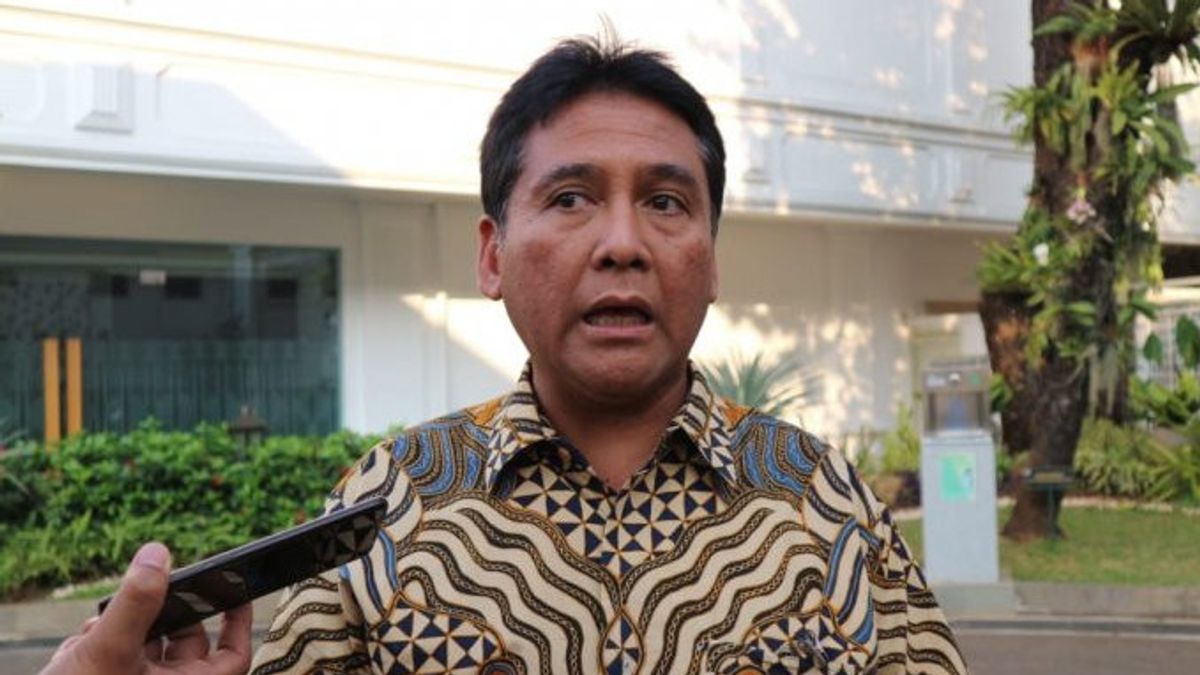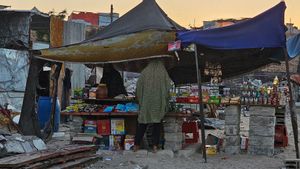JAKARTA - Chairman of the Indonesian Employers' Association (Apindo), Hariyadi Sukamdani questioned the basic rules used by the Confederation of Indonesian Trade Unions (KSPI) for requests for an increase in the district/city minimum wage (UMK) in 2022 at around 7 percent to 10 percent.
"Regarding the amount of 7 percent or how much it refers to which rule, what is the basis? Frankly, we don't know what the basis is," said Hariyadi, in a virtual press conference, Tuesday, November 2.
According to Hariyadi, the determination of the 2022 UMK should refer to Law (UU) Number 11 of 2020 concerning Job Creation and Government Regulation (PP) Number 36 of 2021 concerning Wages.
Hariyadi explained that when viewed from the provisions governing the amount of wages prior to the existence of these two regulations, there were provisions regarding Decent Living Needs (KHL) which were regulated in the Minister of Manpower Regulation Number 18 of 2020 concerning Amendments to the Regulation of the Minister of Manpower Number 21 of 2016 concerning Decent Living Needs.
However, Hariyadi continued, because there is already a Job Creation Law and PP Number 36 of 2021, of course the Permenaker Number 18 of 2020 is no longer used. According to Hariyadi, if you refer to the regulation, the result will be no increase in wages.
"We tested, there are 64 components, for Jakarta alone, the result is that the KHL is below the minimum wage. It doesn't increase. We include the others, the inflation is low, the economy is also dropping," he said.
On the same occasion, Deputy Chairman of the National Wage Council (Dapenas RI) Adi Mahfudz, explained that the UMP is the government's domain to determine. An increase in the UMP to 10 percent is certainly not realistic. Especially in the current pandemic situation. In fact, business actors in several sectors are still affected by the pandemic, and it will take 2-3 years to stabilize.
Adi admitted that he had conducted a survey on the calculation of the minimum wage based on KHL in four markets in Jakarta. Based on a sampling test at Senen Market, Koja Market, Cipinang Market, and Sukapura Market, it was found that the average minimum wage based on the 64 components of the KHL was IDR 3,646,919.
Furthermore, Adi emphasized that the picking test was not carried out as a reference or basis for setting the UMK. However, only to balance the data owned by KSPI.
"The KHL in the Senen market is Rp. 3,654,386, while in Sukapura, of the 64 KHL items, it is Rp. 3,593,746, the Koja market is Rp. 3,729.995, Cipinang is Rp. 3,632,550. It clearly means that the rate of increase for the current year is 21 percent, it's too high," he said.
Therefore, said Adi, an increase of 7 to 10 percent is highly unlikely. In addition, the calculation of the UMP this time is based on the economic growth or inflation of each province. Adi said the determination of the minimum wage will be decided after the official data is released by BPS.
"We cannot assume because it must be based on inflation in each region. We are waiting for the determination from BPS. The components of economic growth are also still waiting for the GRDP of each region," he said.
Previously, the Confederation of Indonesian Trade Unions (KSPI) would stage a demonstration to take to the streets to demand a minimum wage of 10 percent on October 26. The action was attended by 1,000 factories in 24 provinces and more than 100 regencies/cities.
KSPI President Said Iqbal said the demonstration was the initial attitude of workers asking for an increase in the UMK next year to reach 7 to 10 percent. Because based on the survey results, an average of 60 items of decent living needs (KHL) have increased.
"From the survey, it was found that the most experiencing price increases was transportation, especially public transportation with very few pandemics operating so they switched to online transportation so that transportation costs rose sharply. The prices of basic commodities also increased by an average of 7-10 percent," he said.
Iqbal said that if the government does not respond to tomorrow's action, then it will take even bigger action and it is possible that it will end in a national strike by stopping production.
"This is the initial action of workers taking to the streets. If they are not heard, there will be further actions and the culmination does not rule out the possibility of going on strike, stopping production, but we will see how it develops," he explained.
The English, Chinese, Japanese, Arabic, and French versions are automatically generated by the AI. So there may still be inaccuracies in translating, please always see Indonesian as our main language. (system supported by DigitalSiber.id)













